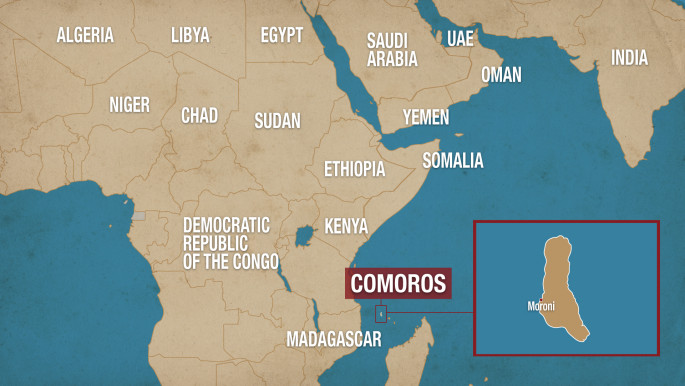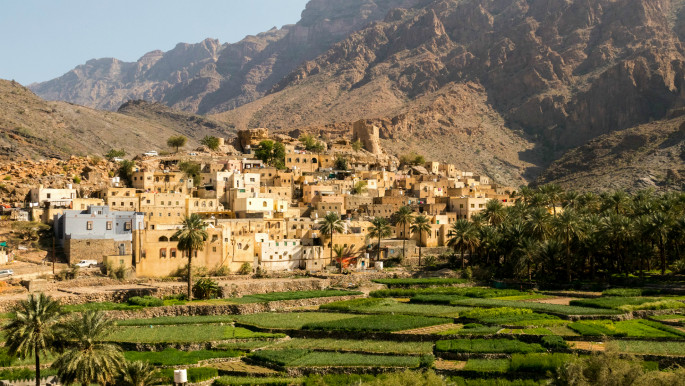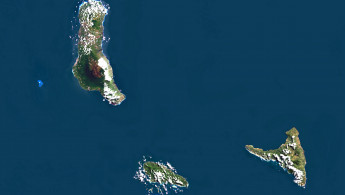Comoros: The tiny islands spearheading the fight against climate change
Climatologists suggest that, just as global warming is exacerbating environmental issues across the Arabian Peninsula, so too is climate change pushing the Comoros to the brink of an ecological disaster that could fast become a matter of life and death.
Erratic rainfall has led to a paradoxical combination of droughts and floods, hindering agriculture in a country where farm work employs up to 80 percent of the population. Today, taro and other crops on which impoverished farmers used to depend for their livelihoods no longer grow in the Comoros.
"The Comoros faces a range of threats from climate change, including increased variability in rainfall levels, and consequent increased drought, flooding, and threats to the water supplies, for agriculture, drinking, and sanitation," said Simon Wilson, head of communications at the Green Climate Fund, or GCF, an international organisation established by the United Nations Framework Convention on Climate Change that has backed projects in support of environmental protection in the Comoros.
 |
|
 |
Today, taro and other crops on which impoverished farmers used to depend for their livelihoods no longer grow in the Comoros |  |
Deforestation has compounded many of these environmental issues.
Between 1990 and 2000, before the scientific consensus on climate change had taken hold in the international community, forest cover shrunk three percent a year.
Meanwhile, the UN warns that, as the island country's forests disappear, so does the future of the Comoros' food and water security. The UN added on Twitter that, by 2090, rainfall could drop by 47 percent during the dry season. In response, the Comoros has already begun turning to foreign companies for the expensive, energy-intensive process of desalination.
"GCF is working with the Comorian government in two ways: first, through 'readiness support,' which will help the government build capacity to better understand and plan responses to the climate change threats and be able to access funding from GCF and other sources," said Wilson.
 |
|
| A green future: Oman blazes a trail for environmentalism in the Arab world |
"Secondly, GCF is funding the project 'Ensuring Climate-Resilient Water Supplies in the Comoro Islands,' which will directly help nearly half a million people manage water supply and strengthen water infrastructure."
Comorians are making additional moves to deal with climate change. In 2013, Comorian officials collaborated with the UN Environmental Programme on a project to improve meteorologists' predictions of how global warming was affecting agriculture in the island country. The Comoros has also partnered with the UN Development Programme to ensure the longevity of Comorian water supply networks.
"We are committed to working with others to create integrated responses to climate change whenever possible, in the Comoros and elsewhere," Wilson told The New Arab.
Abroad, the Comoros has joined other island countries in calling on the international community to do more to curb climate change. Given that the Maldives and a handful of the Comoros' other allies could sink into the sea by the end of the twenty-first century, the urgency of their plight has become all but self-evident.
 |
The UN warns that, as the island country's forests disappear, so does the future of the Comoros' food and water security |  |
In December, these island countries used the Katowice Climate Change Conference as an opportunity to push their larger counterparts to go further in responding to climate change. For its part, the UN has continued to praise the island countries' impressive display of diplomatic unity.
This international solidarity belies the Comoros' history of domestic turmoil. Despite the grim prospect of simultaneous ecological and humanitarian crises, Comorians are struggling to unite in the face of political violence that has long divided the country. In July 2018, gunmen tried to assassinate Comorian Vice President Moustadroine Abdou, whose far-reaching portfolio includes energy policy.
"The political instability of the Comoros has made it difficult for any government to tackle the issue of deforestation and environmental degradation," said Dr Malyn Newitt, a professor emeritus of history at King's College London and author of The Comoro Islands: Struggle against Dependency in the Indian Ocean.
"In particular, this is the case with the island of Anjouan, which is the most overcrowded and where erosion and deforestation are most serious. This is also the island where political instability is most pronounced and where, arguably, government is least effective."
 |
Given that the Maldives and a handful of the Comoros' other allies could sink into the sea by the end of the twenty-first century, the urgency of their plight has become all but self-evident |  |
Only three months after the attempt on Abdou's life, the Comorian Armed Forces battled dissidents opposed to the policies of Comorian President Azali Assoumani, whom many critics accuse of authoritarian tendencies.
The strife will likely increase with the onset of general elections that Assoumani has set for March 24. The strongman's prior bids to consolidate power have courted controversy, tending to distract Comorians from environmental issues and other consequential but apolitical matters.
 |
|
| Can Bosnia's path to peace and environmental protection be replicated in the Middle East? |
If the Comoros wants to withstand the effects of global warming, Comorians must come together to meet the challenge. A comprehensive environmental policy will require the type of unity that has so far eluded the island country.
Assistance from the international community will also prove critical. Possible sources include the Arab League, which can offer the Comoros the support necessary to prepare for the consequences of climate change. The regional organisation has already worked to mitigate humanitarian crises in member states such as Sudan and Yemen. Now, the Comoros needs the Arab League.
With the exception of Oman, the Persian Gulf's Arab monarchies have earned a reputation for preventing international action on global warming, not spearheading it. In Katowice, Kuwait and Saudi Arabia refused to endorse a landmark report on the effects of climate change that island countries had championed.
 |
The Persian Gulf's Arab monarchies have earned a reputation for preventing international action on global warming, not spearheading it |  |
Coming to the aid of the Comoros provides Kuwait, Saudi Arabia, and the rest of the Arab League a chance to right that mistake. Qatar, Saudi Arabia, and the United Arab Emirates can leverage their sizable diplomatic influence to rally the regional organization behind the Comoros.
"The most important ways that outsiders could help would be through serious reforestation programmes and greater emphasis on renewable energy sources," Newitt told The New Arab, hypothesising how the Arab League could contribute. "At present, the islands import all their fuel needs."
Austin Bodetti studies the intersection of Islam, culture, and politics in Africa and Asia.
He has conducted fieldwork in Bosnia, Indonesia, Iraq, Myanmar, Nicaragua, Oman, South Sudan, Thailand, and Uganda. His research has appeared in The Daily Beast, USA Today, Vox, and Wired.



